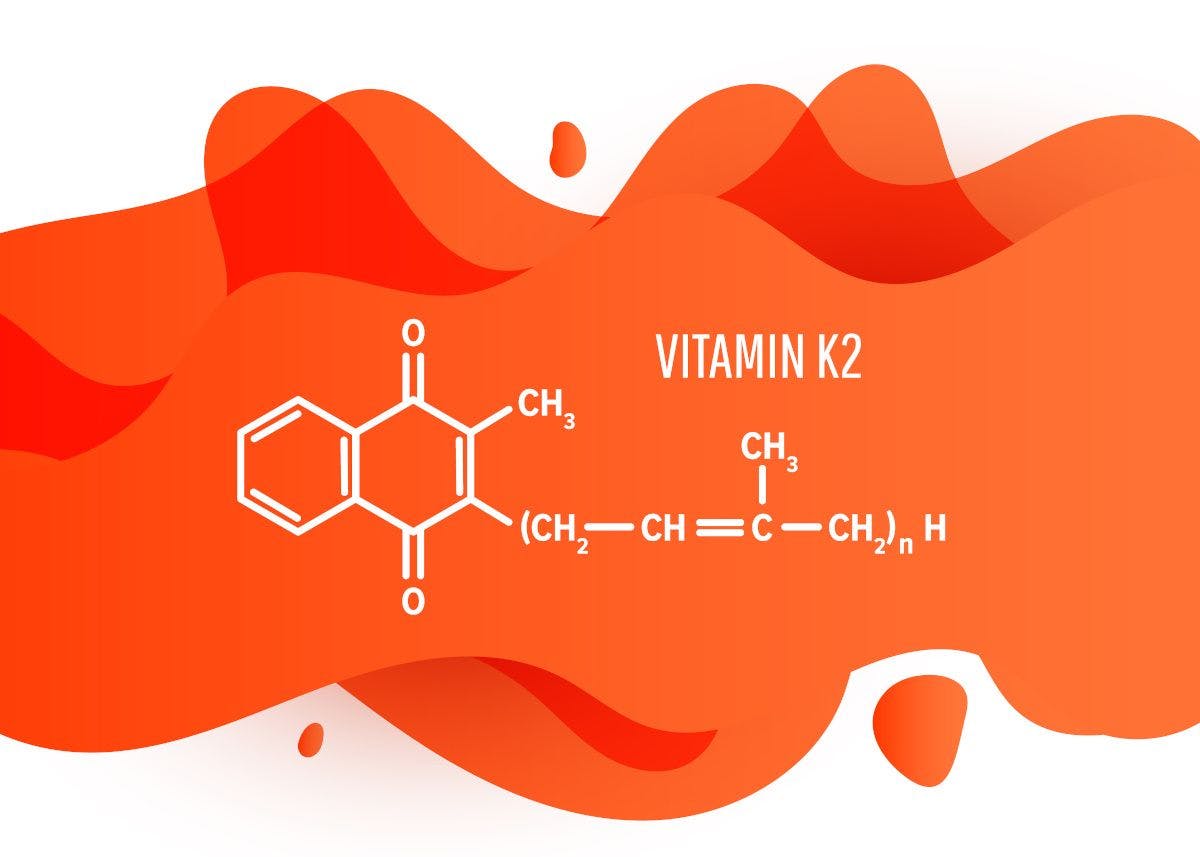Spotlight on Vitamin K2
A look at the hype behind vitamin K2; its benefits, formulation considerations, and opportunities.
Photo © AdobeStock.com/Shi

Vitamin K was originally discovered in 1936 for its role in clotting blood. The vitamin has two isoforms: phylloquinone (K1) and menaquinone (K2). Dietary sources for K1 include green vegetables such as spinach, cabbage, and kale, or fruits such as avocado, kiwi, and grape. Dietary sources of K2 include fermented food such as natto, which is a Japanese dish fermented from soybeans using the bacteria Bacillus natto, and more commonly in dairy, chicken, sauerkraut, egg yolks, beef, and salmon.1
In addition to its role in coagulation, vitamin K-dependent proteins also have a role in bone2 and cardiovascular3 health. Sales of vitamin K supplements in the bone health category are particularly strong. According to data from SPINS, the 52 weeks ending December 3, 2023, vitamin K was among the top ten best-selling ingredients in the bone health category of the mainstream multioutlet channel with $3.2 million in sales, an increase of 40% compared to the previous year.
Vitamin K2 is still relatively novel to the marketplace. It doesn’t even have an official daily recommended intake. Current daily recommended intakes of vitamin K are set based solely on vitamin K1. For example, the National Academy of Medicine (NAM) sets the required vitamin K dosage for adult men at 120 µg/day and 90 µg/day for women, while the World Health Organization (WHO) and the Food and Agriculture Organization (FAO), the dosage is 65 µg/day for men and 55 µg/day for women, on the basis of 1 µg/day/kg vitamin K. The Commission of the European Communities, for its part, sets a reference daily intake for vitamin K of 75 µg/day.1 Optimal levels of vitamin K1 can be achieved through dietary means relatively easily while K2 only accounts for 25% of total vitamin K intake.1
So, while K1 deficiency is rare, and people can get optimal levels from their diets, vitamin K2 is consumed in smaller amounts, and some research indicates that when it comes to cardiovascular and bone health, vitamin K2 may be the superior option.1 Research also indicates that vitamin K2, particularly in the form of menaquinone-7, is readily absorbed and is available longer in circulation to be absorbed by extrahepatic tissues.1
The body of evidence for vitamin K2 continues to grow but it is gaining a foothold in the dietary supplement industry. In the last three years, there have been two examples of vitamin K2 as MK-7 companies being acquired by major firms, namely NattoPharma by Gnosis by Lesaffre4 (Marcq-en-Baroeul France), and Kappa Bioscience by Balchem5 (Montvale, NJ).
Consumers are also becoming more aware of the ingredient. A survey conducted by the Industry Transparency Center in 2022 found that 62% of respondents reported using vitamin K2 supplements and ranked vitamin K2 among their top 10 supplements. The survey also found that usage of vitamin K2 in the 18-54 age group increased compared to the 55+ age group.6 Given the growing consumer recognition and positive sales trends, brands in the cardiovascular and bone health space may want to consider incorporating vitamin K2 into their formulas.
What to look for
While vitamin K2 on its own can be versatile across a number of dosage formats such as soft gels, tablets, capsule, gummies, and dispersible powders, they can be challenging to use in combination with aggressive ingredients, says Clarissa Geraci, product manager for Gnosis by Lesaffre. “Vitamin K2 is sensitive to certain environments. Moisture and mineral salts can lead to vitamin K2 degradation and have driven the need for enabling technologies that protect the K2 molecule. This is particularly true when formulating in combination with minerals,” she explains.
“Many of the multi-vitamin or combination ‘K2 + mineral’ formulations sold are not using a protected vitamin K2 and therefore not meeting label claims as the vitamin K2 content is degrading at an alarming rate resulting in little to no K2 being found in the product,” says Lindsay Cole, sales & business development manager, North America, Kappa Bioscience AS, now a Balchem company. This means manufacturers need to pay close attention to quality, purity, more specifically the iromeric purity and stability, explains Cole.
Both Gnosis and Balchem use a proprietary system to maintain the stability of their respective vitamin K2 ingredients: MenaQ7 and K2Vital Delta. The stability in concert with other ingredient is crucial not only to maintain the integrity of the ingredient, but because vitamin K2 does have a synergistic relationship with several ingredients.
Synergies & opportunities
The relationship between vitamin K2 to other minerals and vitamins, such as calcium and vitamin D3, is what makes K2 such a valuable ingredient in the cardiovascular and bone health space. For example, vitamin K2 activates matrix Gla protein (MGP), which is considered one of the strongest inhibitors of vascular calcification. When activated, MGP undergoes a process called carboxylation that allows it to regulate calcification directly by inhibiting formation and solubilization of calcium crystals. Uncarboxylated MGP does not regulate calcification, and the presence of uncarboxylated MGP is used as a marker for vitamin K2 status.7
“Through its vital role in managing how the body utilizes calcium, vitamin K2 is critical in forming a solid bone matrix and a healthy cardiovascular system via the activation of vitamin K-dependent proteins (VKPDs) osteocalcin and MGP,” explains Geraci. “Without sufficient K2 to activate these two proteins, bone and heart health will be negatively impacted. Therefore, any bone complexes formulated with minerals such as calcium should always incorporate K2 to ensure optimal and safe calcium distribution in the body.”
“The relationship between calcium, magnesium, vitamin D3 and vitamin K2 is crucial,” adds Cole. “Vitamin D3 helps absorb calcium and synthesize calcium-binding proteins, while vitamin K2 activates these proteins to direct calcium into the bones. Magnesium plays a pivotal role in enabling this interaction as it unlocks the full potential of vitamin D. This vitamin K2 + minerals combination offers a comprehensive solution for consumers seeking optimal health and wellness in bone, heart, and immune health.”
Research has shown that vitamin D enhances the concentrations of vitamin K-dependent bone proteins to induce bone formation by stimulating osteoblast-specific gene expression of osteocalcin.8 In human intervention studies, the combination of vitamin K and vitamin D has been shown to support the bone mineral density of post-menopausal women with osteoporosis.8
Omega-3 fatty acids may also have a synergistic relationship with vitamin K2, says Geraci. “This duo has a compelling set of combined health claims with complementary, scientifically validated mechanisms of action for heart and bone and activities to control inflammation,” she explains. “By balancing calcium, K2 has a synergistic role with omega-3, creating unsurpassed cardiovascular formulas that also deliver bone health benefits. In addition, it is an excellent combination for early development in children, providing brain support, healthy eyes, and strong bones.”
Brain health may be an area of opportunity for vitamin K, says Geraci. “MenaQ7-specific research highlights K2’s capacity to modulate oxidative stress, inflammation, and vascular stiffness,” she explains. “Simultaneously, it activates VKDPs and supports mitochondrial function, which may contribute to a comprehensive approach to cognitive well-being.”
A recently published study found a connection between insufficient vitamin K levels and cognitive impairment in a group of older adults with an average age of 75 years.9 “Population studies show a connection between atherosclerosis, arterial calcification, and arterial stiffness with an increased risk of dementia and cognitive impairment,” Geraci adds. “A healthy cardiovascular system ensures optimal blood flow and provides the brain with the necessary nutrients and oxygen. This makes for a solid foundation as more evidence establishes vitamin K2’s potential role in cognitive health.”
With growing consumer awareness, sales, and scientific validation, vitamin K2 may be a compelling addition to your portfolio.
References
- Halder, M.; Petsophonsakul, P.; Akbulut, A.C.; Pavlic, A.; Brohan, F.; Anderson, E.; Maresz, K.; Kramann, R,; Schurgers, L. Vitamin K: Double Bonds beyond Coagulation Insights into Differences between Vitamin K1 and K2 in Health and Disease. Int J Mol Sci. 2019, 20 (4), 896. DOI: 10.3390/ijms20040896
- Vitamin K. Harvard T.H. Chan School of Public Health. March 2023. https://www.hsph.harvard.edu/nutritionsource/vitamin-k/(accessed 2024-02-28)
- Ballegooijen, A.J.; Beulens, J.W.; The Role of Vitamin K Status in Cardiovascular Health: Evidence from Observational and Clinical Studies. Curr Nutr Rep. 2017, 6 (3), 197-205. DOI: 10.1007/s13668-017-0208-8
- Marrapodi, A. Gnosis by Lesaffre acquires NattoPharma to expand its vitamin K2 offerings. Nutritional Outlook. May 26, 2021. https://www.nutritionaloutlook.com/view/gnosis-by-lesaffre-acquires-nattopharma-to-expand-its-vitamin-k2-offerings (accessed 2024-02-28)
- Krawiec S. Balchem has agreed to acquire Kappa Bioscience. Nutritional Outlook. June 14, 2022. https://www.nutritionaloutlook.com/view/balchem-has-agreed-to-acquire-kappa-bioscience (accessed 2024-02-28)
- Grebow, J. Vitamin K2 usage and consumer awareness growing, new survey shows. Nutritional Outlook. July 27, 2022. https://www.nutritionaloutlook.com/view/vitamin-k2-usage-and-consumer-awareness-growing-new-survey-shows (accessed 2024-02-28)
- Hariri, E.; Kassis, N.; Iskandar, J.P.; Schurgers, L.J.; Saad, A.; Abdelfattah, O.; Bansal, A.; Isogai, T.; Harb, S.C.; Kapadia, S. Vitamin K2—a neglected player in cardiovascular health: a narrative review. Open Heart. 2021, 8 (2), e001715. DOI: 10.1136/openhrt-2021-001715
- Ballegooijen, A.J.; Pilz, S.; Tomaschitz, A.; Grübler, M.R.; Verheyen, N. The synergistic interplay between vitamins D and K for bone and cardiovascular health: A narrative review. Int J Endocrinol. 2017, 2017. DOI: 10.1155/2017/7454376
- Azuma K.; Osuka, Y.; Kojima, N.; Sasai, H.; Kim, H.; Inoue, S. Association of vitamin K insufficiency with cognitive dysfunction in community-dwelling older adults. Front Nutr. 2022, 8. DOI: 10.3389/fnut.2021.811831

.png&w=3840&q=75)

.png&w=3840&q=75)



.png&w=3840&q=75)



.png&w=3840&q=75)














